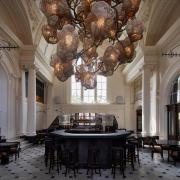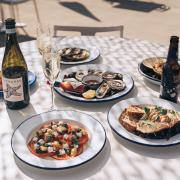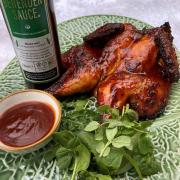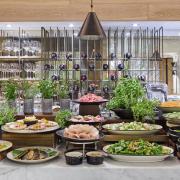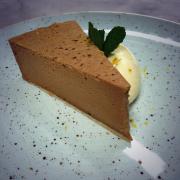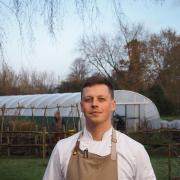Artisan spirits are a booming business. You can visit any or all of Kent’s fascinating distilleries in search of your new favourite tipple

• Copper Rivet, Chatham
The Russell family’s Copper Rivet Distillery opened in 2016. Set in a beautiful Victorian pump house at Chatham Dockyard, the historic surroundings and full ‘grain-to-glass’ distillation process make this a particularly popular choice for distillery tours.
“My father has been in the business for more than 40 years and my brother for more than 20 years,” says founder Stephen Russell. “So I grew up around the industry. For years we believed there’s space in the market for a range of Kentish spirits, using Kent’s amazing produce – in our case grain – and building a local business with local consumers at its heart.
“Making spirits is a very involved process. First we have to plant seeds and grow the grain. We use Kentish spring barley and soft winter wheat and rye and once it’s harvested we store it until we need it.
“We have three stills, Sandy is our whisky still, Joyce is one of the few 10m tall column stills in the UK and Janet is a unique gin still.

“Dockyard Gin is a real favourite of everyone; it’s designed to be easy going and, frankly, just a lovely drink. And we’ve recently added a Dockyard Oak Aged Damson Gin.
“Being part of Chatham Maritime and at the site of the former Royal Dockyard has inspired us in so many ways. It was a truly a world-class facility and was a hotbed of innovation and craft. That’s partly why we designed and made our still ourselves with local craftsmen; why we decided we must create our own spirit rather than buying it wholesale; and why we decided to go further than almost any other distillery and grow our grain in partnership with local farmers.
“Our distillery tour is a top-rated experience on TripAdvisor. As part of the tour there’s a spirit tasting and, of course, a gin and tonic in our cosy bar. The only tip is to plan your visit – our tours are often booked up a month in advance.”

• Anno Distillers, Marden
Founders Dr Norman Lewis and Dr Andy Reason were originally scientists from the pharmaceutical industry but when their programme was closed in 2010 they followed their passion for spirits and formed Anno Distillers. Kim, Andy’s daughter, completes the team.
“Our first licenced distillery was the kitchen at Andy’s house,” says Norman. “And that is where exploration of the flavours was first carried out. As self-confessed perfectionists it took 18 months of small-scale distillations and blending experiments to hone the recipe into something that we were happy to market. This work resulted in what can now be enjoyed as Anno Kent Dry Gin, released in 2013.
“Sales of the Anno products have been rising year on year and at the end of 2017 the company reached a turnover of £500K. We currently have five products in the Anno family: two distilled gins, two compounded gins and an elderflower vodka. We also have an exclusive cask of malt whisky resting in the distillery, produced in collaboration with Westerham Brewery.

“It can be no real surprise that we used a scientific method in developing our recipe. We started by spending time in the British Library, researching the history of gin and the wide variety of botanicals that have been used to flavour it over the centuries.
“All gins, by law, must have juniper, but the rest is down to the distillers’ own preference. There are many other factors that affect the quality of the spirits and the skill of the distiller is important in achieving the desired product quality.
“We run tour and tasting events at the distillery which are intended as educational, fun times where visitors learn about the company and some of our challenges, as well as how we make our gins in our still, Patience. These events have proved to be very popular and are usually oversubscribed.”

• Greensand Ridge, Shipbourne
Set in the village of Shipbourne, near Tonbridge, Greensand Ridge is a micro distillery on a mission. The man behind it is Will Edge, who set up the business in 2015.
“I’m a lifelong hobbyist of alcoholic drinks including brewing, cider-making and myriad infusions,” says Will. “I wanted to make something I am proud of, work an active lifestyle and be my own boss.
“I began a Masters degree in brewing and distilling in 2013, and the rest is history.

“We have the best equipment money can buy - a 300l holstein copper pot still with rectifying column and all the bells and whistles. If you want to make good rum and brandies you can’t scrimp on equipment. As well as that we’ve got tanks, fermentation vessels, stacks of casks of maturing spirits... the list goes on. It’s a big shed full of toys.
“We make gins, rums and fruit brandies. Sustainability should be at the core of every business, but in distilling, like other industries, it isn’t. So we’re quite different for that reason. Every decision we make is looked at through the lens of sustainability. As well as making spirits with surplus produce, we use 100 per cent renewable power, we’re zero plastic and zero chemical, we’re aiming for zero waste and we support local and national causes which align with our ethics.
“Gin fans can visit the distillery and distil their own bottle, choosing from a library of botanicals and using a copper still to distil them while enjoying a G&T and sampling our range. It’s a fabulous and personal event that everyone comes away happy from.”

• Canterbury Brewers & Distillers
Based at The Foundry brewpub in the heart of historic Canterbury, Canterbury Brewers and Distillers are an example of a small artisan operation.
Starting out brewing their own beer onsite, director Jon Mills explains how they made the jump to spirits. “My business partner Gary and myself have been in the hospitality business all our lives and have a passion for food and drink.
“The distilling was a natural progression for our business; we have been brewing a range of award-winning beers for the last eight years and had reached capacity.

“Instead of expanding the brewing to an industrial estate, we really wanted to keep specialist and artisan so we stopped actively selling outside of the brewpub and set up the distillery. We are one of a small but growing number in the country to make spirits from grain all the way through to end product.
“Our Canterbury Gin starts its journey with its own distinct base alcohol, with unique flavour. So the whole process happens here on site, where we turn English barley, Kent water, American west coast yeast and eight of the highest quality botanicals into gin within the historic city walls. We are also one of a very small number to distil rum, fermenting A grade molasses on site. Our apple brandy will be ready for Christmas and a number of other fruit brandies are also in the pipeline. In January we also started distilling our first single malt, single barrel whiskey. The wash was made with yeast extracted from St Augustine’s Abbey here in Canterbury.
“There is a growing demand from people to know where their food comes from, how it’s made and who made it. I don’t think the gin boom and the growth in artisan craft product is a coincidence. As with true craft beer, I believe it is here to stay.”

• Maiden Distillery, Maidstone
Helen Vining previously made gin and vodka infusions with commercially bought spirits, which she sold at festivals and farmers’ markets. Wanting to explore more of the production process she researched distilling methods and how Kent featured in the story of gin. She launched Maiden Distillery in 2014 and runs the small operation single-handedly from a former brewery in Maidstone.
“I love history, and was interested in aromatherapy, so gin production was a great way to marry history and potion making. Throughout my research it became clear that gin production in Maidstone had been an extremely important industry. I discovered many documents about Maidstone Gin and have been delighted to resurrect this old industry and recreate Maidstone Gin.

“As well as a brewery, the building I work from was the site of Argles Bishop’s distillery. Argles Bishop was the nephew of an influential distiller who ran Maidstone Distillery in the 1700s and he left the family distillery in Bank Street to set up his own here. The building is very special and still retains much of the original character. It’s fundamental to my business story and I am thrilled to be able to continue making gin on this site.
“I now make four gins. I’ve also created a number of winter and traditional blends which form part of my tasting sets. All the gins are distilled extremely slowly in a small copper still, named Arwen. Only between 65 and 70 bottles are made per batch so anyone buying a Maiden product can be assured it’s a truly artisan product.
“The public can visit the distillery on special visit days, held once a month. After successfully launching my online shop at the end of 2018 it became clear that people would like to visit more regularly so I plan to open the distillery twice a week this year.”




